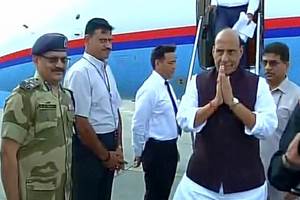
To say that the duplicity of Pakistani leadership was exposed today, when it blacked out media coverage of Indian Home Minister Rajnath Singh’s speech during the SAARC Interior Ministers’ conference in Islamabad, would be an understatement. For there have been innumerable times when politicians of the troubled country exposed their real character — which continues to be defined by diplomatic treachery and their own fear of the terror elements they continue to breed. It is interesting, as well as admirable, that India continues to try to have a dialogue, to restore some sense in Pakistani leadership.
In the last 16-17 years alone, Pakistani leadership can be said to have stabbed India from behind several times. When then Prime Minister Atal Bihari Vajpayee started a bus service to Lahore to improve relations between the neighbours, Pakistani leaders responded with a war in Kargil. In later years, Pakistani leaders continued with their ‘Bleed India Policy’ by backing, covertly or overtly, terror outfits to carry out blasts in India. The attacks of 26/11 in Mumbai by 10 Pakistani terrorists was the peak the country could have achieved with the policy. Several dossiers, dialogues, international as well as bilateral meets later, the chief perpetrator, head of Lashkar-e-Taiba Hafiz Saeed, continues to roam free across the country and even organise protests not only in Pakistan but also back some in Kashmir.
Today’s blacking out of Singh’s speech need not be seen as exposing Pakistan, but its leaders and how they are collectively determined to push the country further into an abyss. Singh’s visit to Pakistan was marked by protests across the country by terror outfits, including the one led by Saeed, who protested against the “welcome” accorded to Singh by Pakistani officials. Last month, Saeed had organised a mock funeral of Hizbul terrorist Burhan Wani, who was killed in an encounter by Indian Armed forces in Kashmir. Saeed called Wani a martyr, and so did Pakistani Prime Minister Nawaz Sharif. This was no different from 2008. When proof emerged that Mumbai attackers were from Pakistan, the country’s leaders’ claimed the attack in Mumbai was conducted by “non-state actors.”
Also read: Why Pakistan blacked out media from covering Rajnath Singh speech
Today’s incident in Islamabad was not just a public humiliation of India, it has also confirmed two things about Pakistan. First, Pakistani leaders have no voice of their own, that they are guided by terror satraps and the country’s sinister intelligence agency. Second, in Pakistan terrorists can organise protests, be interviewed by media, but anyone speaking against terrorism, even if he is a state guest, is to be gagged.
In his speech, Singh delivered a strong message against terrorism. “Those who provide support, encouragement, sanctuary, safe haven or any assistance to terrorism or terrorists must be isolated. Strongest possible steps need to be taken not only against terrorists and terrorist organisations but also those individuals, institutions, organisations or nations that support them,” he said.
Considering the limitations of Pakistan, it is clear that the country’s leaders couldn’t have allowed the live coverage of the event. If beamed live through TV across Pakistan, it could have angered further the militant outfits protesting since Wednesday which Pakistani leadership can’t afford.
As India-Pakistan embarks on another troubled phase of diplomatic ties after today’s incident, it remains to be seen if people of Pakistan can see the duplicity of their leaders; if they can rise for peace. And it also remains to be seen if the international community would continue to reward Pakistan for its duplicity at the cost of India?

